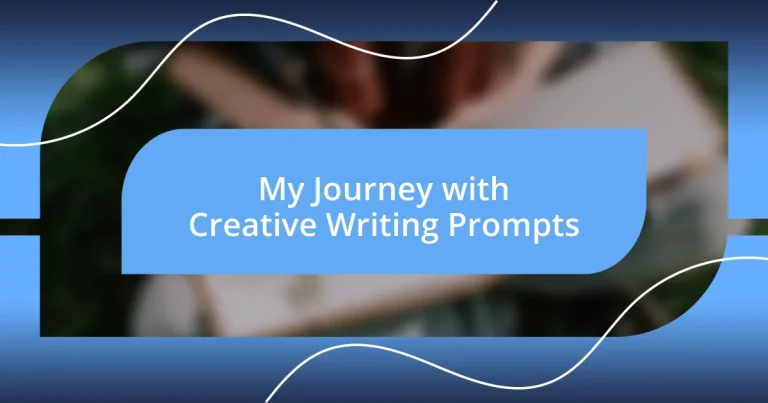Key takeaways:
- Creative writing prompts can ignite creativity, helping writers overcome blocks and explore new perspectives.
- Finding the right prompts is a personal journey that involves trusting one’s instincts and engaging with writing communities.
- Sharing and receiving feedback on writing fosters growth, connection, and collaboration among writers.
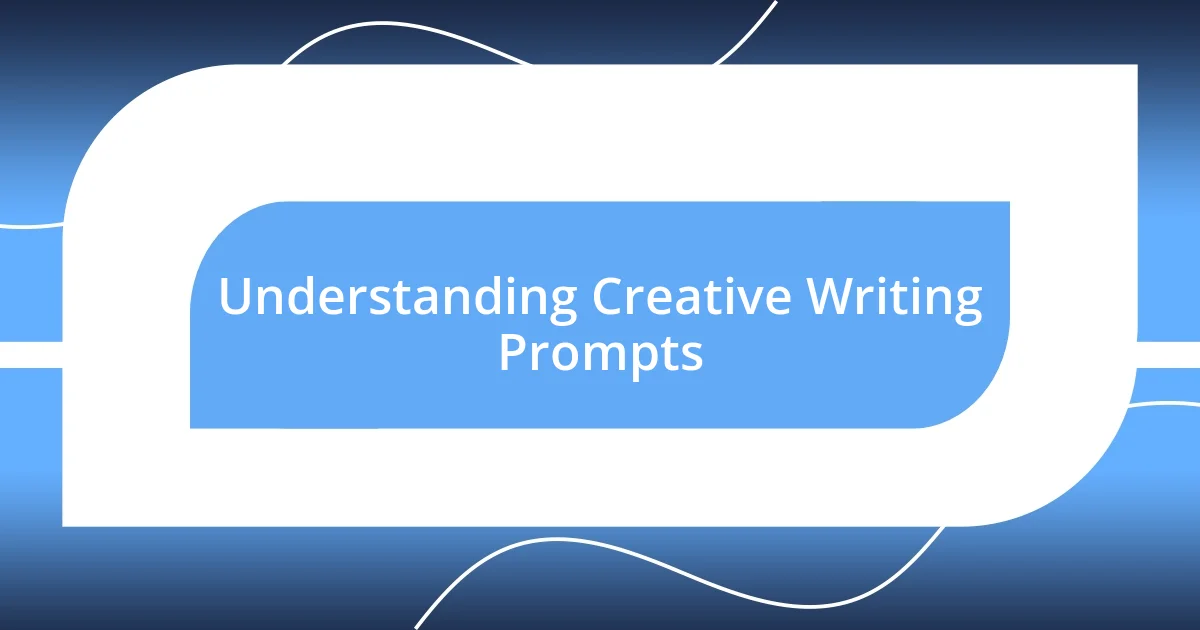
Understanding Creative Writing Prompts
Creative writing prompts serve as a springboard for our imaginations, nudging us out of our comfort zones. I remember when I first stumbled upon a prompt that asked me to write from the perspective of an inanimate object. At first, I felt foolish, but in exploring a day in the life of a lonely park bench, I discovered an unexpected depth of emotion.
These prompts have an incredible ability to ignite creativity by challenging our typical thought patterns. Have you ever felt stuck, staring at a blank page? It’s a frustrating experience that many of us are all too familiar with. I can recall times when a simple prompt transformed my writer’s block into a whirlwind of ideas, allowing me to explore characters I never thought I could bring to life.
Understanding creative writing prompts isn’t just about using them to jumpstart our writing; it’s about embracing the unique journeys they can lead us on. They invite us to take risks, tap into our emotions, and share our stories in fresh and unexpected ways. I often find that the most powerful pieces emerge from prompts that push my boundaries, reminding me that every story matters—even the quiet ones.

Finding the Right Prompts
Finding the right prompts can feel like searching for hidden treasures. Sometimes, I come across a prompt that resonates so deeply it feels like it was crafted just for me. One time, I found a prompt about writing a letter to my younger self. Pouring my heart into that piece allowed me to confront old fears and embrace my growth as a writer, which was both cathartic and enlightening.
It’s essential to consider what sparks your interest. I often browse various sources, from books to online communities, to discover prompts that align with my current state of mind. Sharing prompts with fellow writers can also lead to exciting discoveries; I recall a group session where we swapped ideas and found that different perspectives added a vibrant twist to our writing.
Ultimately, finding the right writing prompts is a personal journey. Reflecting on my experiences, I’ve learned to trust my instincts about a prompt’s potential. If a particular prompt stirs something within me, I know I’m onto something special. Do you have a prompt that has changed your writing approach? I’d love to hear your stories!
| Type of Prompt | Personal Experience |
|---|---|
| Character Development | Writing a backstory for a character that resonates with me helped unlock new levels in my storytelling. |
| Setting Exploration | Describing a city I love in a different timeline pushed me to experiment with genre. |
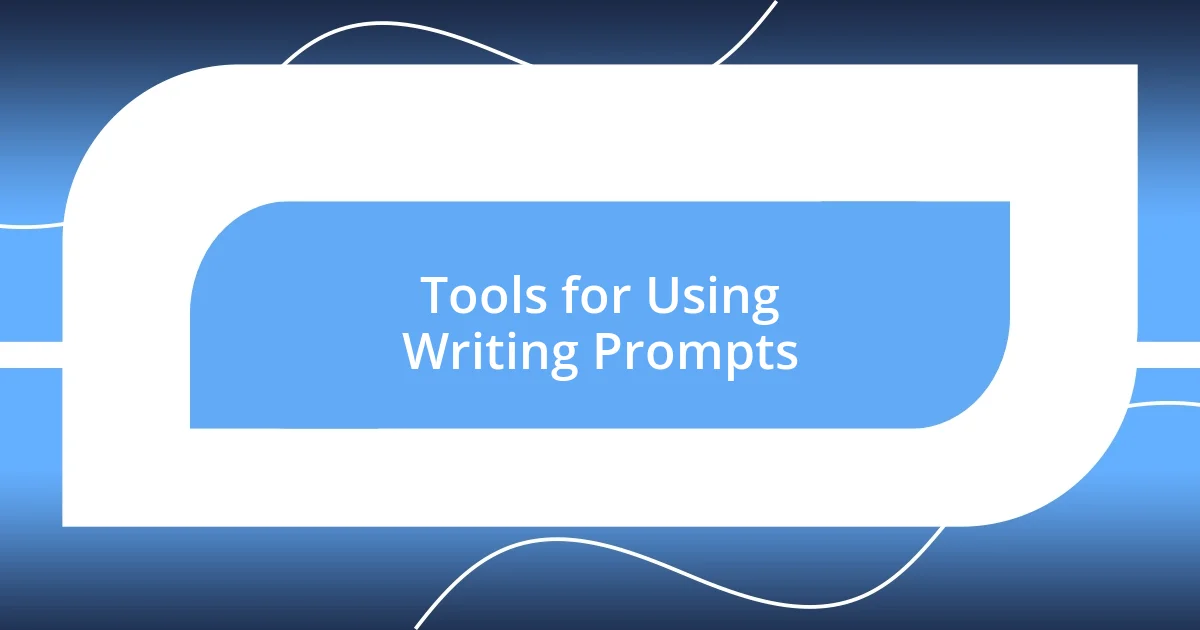
Tools for Using Writing Prompts
When it comes to effectively utilizing writing prompts, having the right tools can make a substantial difference. I’ve often relied on digital notepads or apps like Evernote and Google Keep to jot down ideas as they come. There’s something exhilarating about capturing a fleeting thought on my phone during a busy day; it’s like savoring a distant whisper of creativity.
Here’s a list of tools that have worked wonders for me:
- Journals: I keep a dedicated writing journal where I set aside time to explore my thoughts without judgment.
- Voice Recorders: When inspiration strikes but writing isn’t feasible, I record my ideas and listen back later to spark creativity.
- Online Writing Communities: Engaging in forums allows me to share prompts, receive feedback, and discover new angles on my writing.
- Mind Mapping Software: Programs like XMind help me visualize the connections between ideas and prompts, making brainstorming more dynamic.
Utilizing various tools often enriches the experience of working with writing prompts. On days when I’m feeling uninspired, I like to rearrange my workspace or even change the scenery entirely. I recall sitting outside in a bustling café, where the vibrant atmosphere helped breathe life into a stale story. The combination of my tools and surroundings can transform the mundane into the extraordinary, creating an environment ripe for creative exploration.
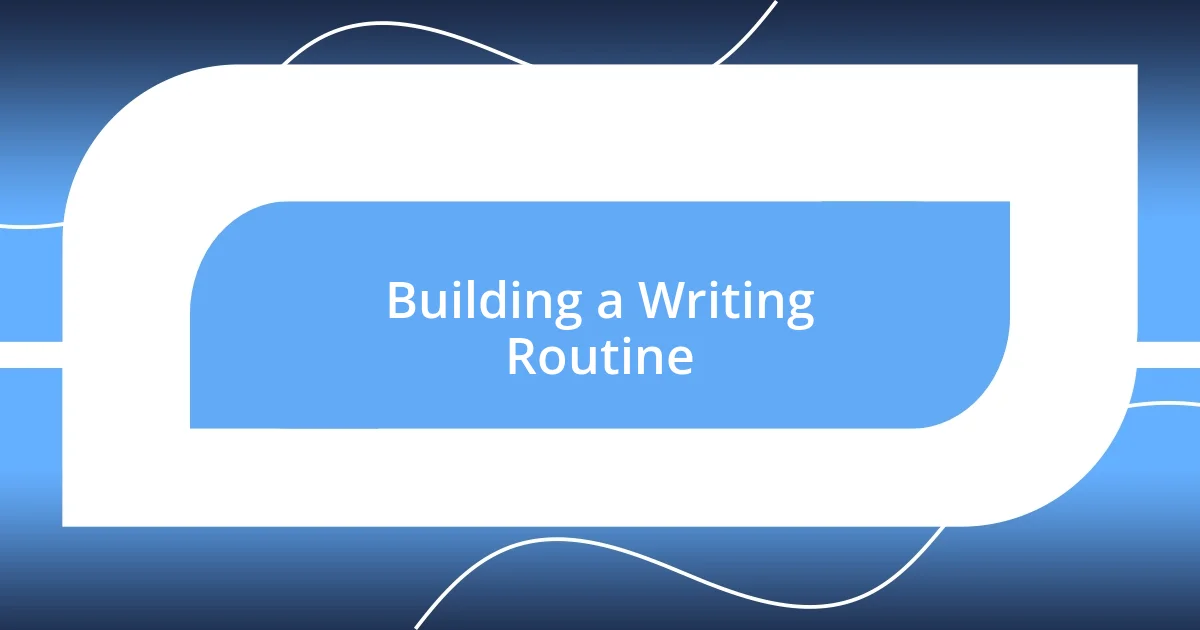
Building a Writing Routine
Building a writing routine is a deeply personal experience, shaped by habits that cater to my unique rhythm. I’ve found that committing to a specific time each day can do wonders for my creativity. For instance, setting aside my mornings for writing often leads to a flood of ideas, as my mind feels fresh and unencumbered by the day’s distractions.
Experimenting with different environments has also played a crucial role in solidifying my routine. I remember one day when I decided to take my laptop to a quiet park. Surrounded by chirping birds and rustling leaves, the peaceful ambiance inspired a surge of creativity that I hadn’t anticipated. Have you ever noticed how a simple change of scenery can spark new ideas? It’s fascinating how the world around us can feed our writing.
Moreover, I’ve learned to embrace flexibility within my routine. Some days, life throws unexpected challenges my way, and that’s okay. I recall a particularly hectic week when I only managed to write a few sentences instead of my usual pages. Instead of feeling demotivated, I celebrated those words, reminding myself that every small step counts. Have you ever questioned the impact of tiny progress? For me, it’s clear: each word written builds momentum toward something greater.
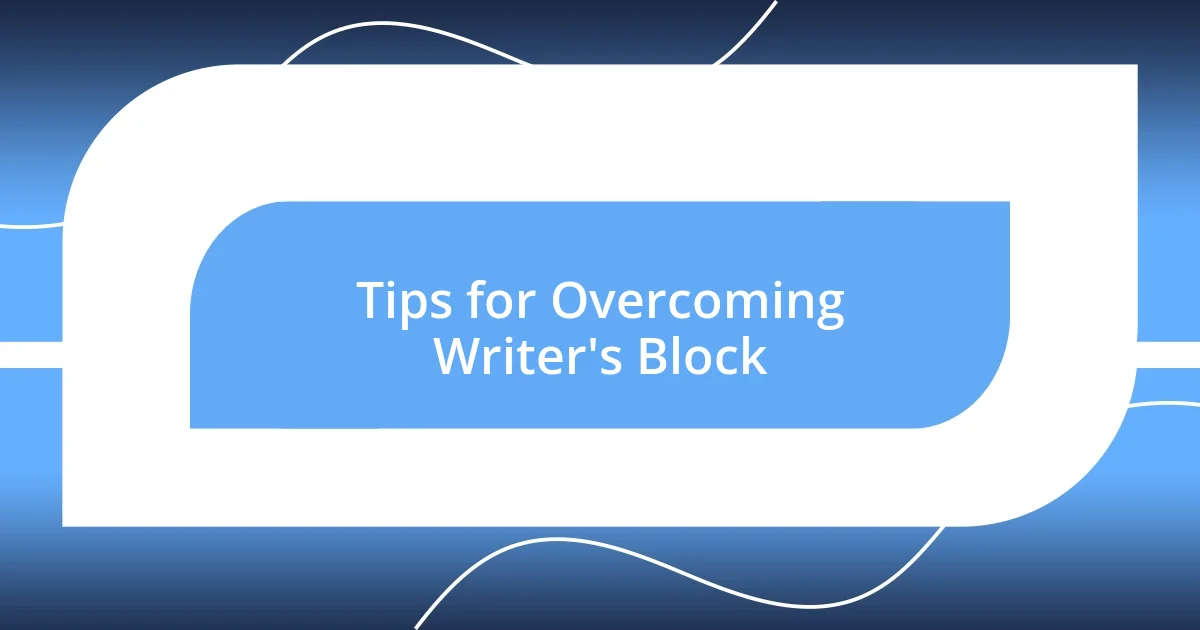
Tips for Overcoming Writer’s Block
When I find myself staring at a blank page, I take a step back and try to shift my perspective. One effective technique I swear by is free writing; it’s liberating to let my thoughts flow without worrying about grammar or structure. I once spent an entire ten minutes jotting down whatever popped into my mind, and surprisingly, some of those chaotic sentences transformed into the seed of a compelling short story. Have you tried free writing? You might just uncover ideas lurking beneath the surface.
Another strategy that has proven invaluable during those creative droughts is setting small goals. Rather than aiming to write a whole chapter, I challenge myself to just write a single paragraph or even a few lines. I remember a particular afternoon when my brain felt like sludge. I told myself I only had to write one impactful sentence. Low and behold, that sentence sparked a torrent of inspiration, resulting in a full page of content. Isn’t it remarkable how breaking tasks down makes them less daunting?
Finally, I often turn to prompts as a lifeline when I’m stuck. I have a collection that I revisit regularly; they serve as a jumpstart to my imagination. There was a time when a simple prompt about “a hidden talent” unlocked a treasure trove of memories and ideas related to my childhood. I locked in on the quirky skills I had then, and it all spilled onto the page. Have you ever noticed how a single prompt can transport you back in time? Embracing these suggestions keeps my creativity flowing and reminds me that the possibilities are limitless.

Sharing and Evaluating Your Work
Sharing my writing has always been a double-edged sword. On one hand, there’s a thrill in giving others a glimpse of my world, while on the other, there’s that gnawing fear of judgment. I vividly recall the first time I shared a poem with my writing group. My palms were sweaty, my heart raced, but the moment I read those lines aloud, I felt an exhilarating mix of vulnerability and freedom. Isn’t it interesting how exposing our work to others can create such a profound sense of connection?
The evaluation process can be a powerful learning tool. When I receive feedback, especially constructive criticism, it can feel like navigating a tricky maze. I remember a time when a mentor pointed out my tendency to overwrite. At first, I was defensive, but as I reread my piece with fresh eyes, I realized they were right. Their insights not only helped me refine that particular work but also became a compass for my future writing. Have you ever had a moment where feedback reshaped your writing journey in unexpected ways?
Engaging with fellow writers also opens up a space for collaboration and new perspectives. I once paired up with a friend to exchange stories, and it sparked such invigorating discussions. We each brought different strengths to the table—her ability to build tension and my knack for vivid descriptions. It’s amazing how sharing and evaluating work can lead to growth, not just as individuals but as a community. Don’t you think that sharing our experiences can deepen our understanding of the craft?
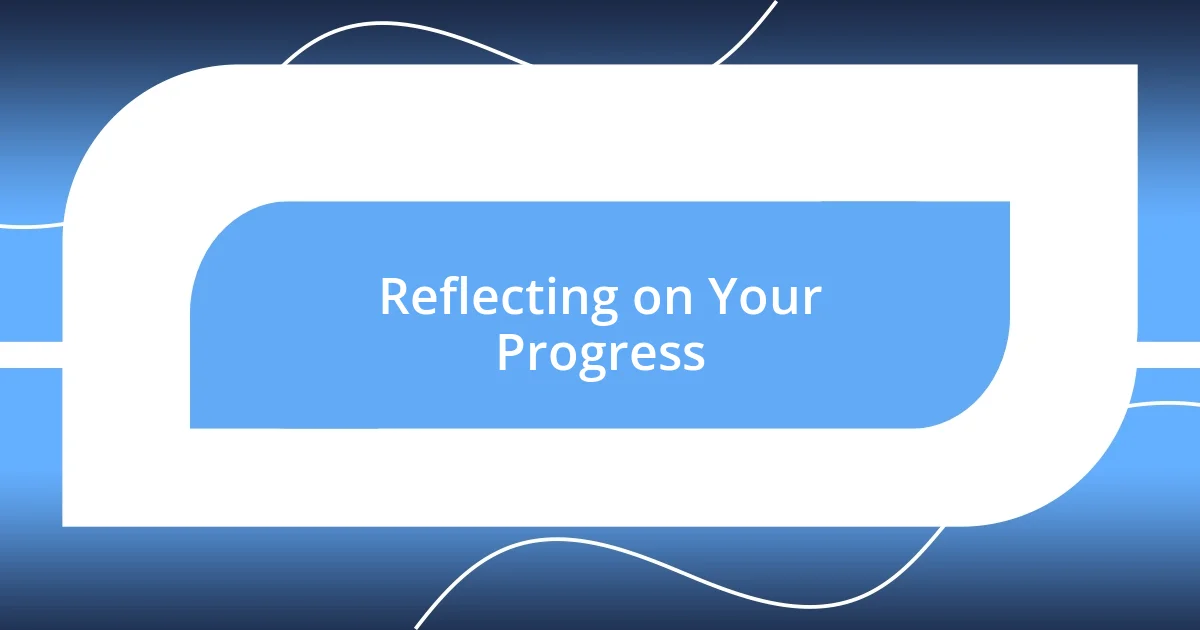
Reflecting on Your Progress
Reflecting on my progress as a writer often feels like unearthing hidden treasures. I love looking back at my earlier pieces and noticing how I’ve evolved over time. Just the other day, I stumbled upon a short story I wrote two years ago; reading it felt like stepping into a time capsule. Have you ever revisited your past work and recognized how far you’ve come?
When I assess my writing journey, I often think about the emotional landscapes I’ve traversed. There were times when I felt lost, overwhelmed by self-doubt. However, those moments of struggle have become crucial milestones. I remember one particularly challenging period when I felt stuck in a creative rut for months. Instead of giving up, I started journaling my feelings, which later sparked a series of poignant essays. It’s incredible how our emotional experiences can fuel our creativity, don’t you think?
Tracking my growth is not just about the words I put on the page; it’s about acknowledging and celebrating those small victories along the way. Recently, I set a goal to write every day for a month. When I reached that milestone, I felt an immense sense of accomplishment—even if some of those entries were just musings. This experience reminded me that progress can take many forms, from completing a poem to simply committing to the process. Have you taken the time to celebrate your own achievements in writing?












